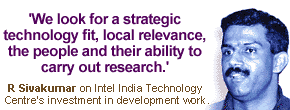

|
|
|
|
| HOME | INFOTECH | HEADLINES | |||
|
August 31, 1999
HEADLINES
|
 R Sivakumar is the director of Intel India Technology Centre. The organisation funds and helps research projects in the country.
R Sivakumar is the director of Intel India Technology Centre. The organisation funds and helps research projects in the country.
The Intel India Technology Centre recently opened a facility in the speech and voice lab of the Indian Institute of Technology at Madras.
From there, he moved on to multimedia and communication technologies and was involved in the development of some of the first local area networks and videoconferencing prototypes. He also was the engineering manager for the development of network multimedia products such as CNN at Work and ProShare Presenter. He corresponded with Shobha Warrier about the role that the Intel India Technology Centre is playing: Why was Intel India Technologies set up separate from Intel Asia Electronics? Intel Asia Electronics was set up for market development in India. The Intel Technology Centre is part of Intel Asia Electronics and focuses on technology dissemination, business development and investments in the market. In India you have set up five labs in important educational institutions like the IITs and the Indian Institute of Science. What are the criteria that you look for when you decide to invest in or sponsor projects? We look for a strategic technology fit, local relevance, the people and their ability to carry out research. How often do you monitor the projects that you sponsor? We have very active interactions with the universities. We have an 'academic relations manager' whose primary role is to work with the universities on a regular basis. Will you in anyway direct the course of research activities? We have an active dialog with the universities on research. Their proposals go to our various research councils that may choose to fund some of the proposals. We also look to groups that may want to work in areas that are important for market development. What does Intel get in return when it sponsors such projects? This varies from project to project. Do you feel the software developer community in India is handicapped as far as availability of technology is concerned in comparison to their counterparts elsewhere in the world? No. It was reported that you are trying to "accelerate the adoption of the latest Intel technologies in industry and academia". By sponsoring projects, is Intel trying to persuade the industry and the academia towards Intel in a subtle way? No. Let me ask you about the speech lab that you are promoting at the IIT, Madras. Professor Yegnanarayana there started his speech and voice technology research sometime in the early Eighties. Do you feel it did not take off well then because the project lacked resources? Technology acceptance in the marketplace is a complex phenomenon. Market conditions are now ideal for adoption of speech as a technology. You are also going to sponsor a five-year research project for the development of a 'phonetic engine' for speech in Indian languages. If the research at IIT-Madras does not produce any specific results in five years, will you abandon the project? If this specific project doesn't work in five years, we will find other things to do. Compared to the research projects that are going on in other parts of Asia, how do projects in India compare? I am perhaps not qualified to make this comparison. However, in absolute terms very good research happens in India. It was reported that Intel is investing in a joint venture with Hong Kong based Pacific Century Group to bring high-speed Internet access through cable television and satellite lines there. Claude Leglise, the vice-president of Intel's home products arm, said in an interview: "From Intel's point of view, we see opportunities in China, India, Malaysia, etc as very, very attractive. We want to tap the tens of millions of homes in Asia that cannot afford a PC." In this context, what are your plans for India? I don't know the specific details of this project. Earlier: Tell us what you think |
||||||
|
HOME |
NEWS |
BUSINESS |
SPORTS |
MOVIES |
CHAT |
INFOTECH |
TRAVEL |
SINGLES BOOK SHOP | MUSIC SHOP | GIFT SHOP | HOTEL RESERVATIONS | WORLD CUP 99 EDUCATION | PERSONAL HOMEPAGES | FREE EMAIL | FEEDBACK |